By YOLANDA L. PUNSALAN
Susan V. Entong was 11 years old when her drunken father threw a kerosene lamp at her, burning her face and body.
For three years, she suffered from festering wounds because hospitals in Bacolod City, Negros Occidental where she lived refused to give her complete medical treatment. She was given a new lease of life when the International Care Ministries (ICM) took her in their custody.
Entong was flown to Seattle, Washington in the US for reconstructive surgery in 2005 where she stayed for 11 months with an ICM host family. In 2007, she returned to the US for follow-up procedures.
Now 22 years old, Entong is an incoming senior high school student this June. She wants to be a nurse or a social worker someday simply because she feels inspired to serve the less fortunate like herself.
Entong is just one of the more than 100,000 destitute people whose lives have been transformed by the ICM, a charity organization that has been serving the poor communities in the country since 1992.
The ICM is a registered non-profit organization in the Philippines, Hong Kong and the US that collaborates with the Global Development Group in Australia and Stewardship in the UK.
Founded by Sharon Pastre, a Singaporean interior designer based in Hong Kong, the ICM’s target recipients are people who earn a daily income of P20, without access to potable water, dwell in shanties with dirt floors and scrap roofs, go to bed hungry at least once a week, or with at least one child mortality in the family.
The ICM currently operates from five key locations in Visayas and Mindanao, namely: Negros Occidental, Negros Oriental, Bohol, Koronadal, and General Santos.
Now in its 20th year, the ICM regularly conducts a 16-week transformation seminar-program, instilling in 31 family participants a well-rounded education curriculum grounded on bible-based values.
The essential health practices imparted to the families center on knowledge of child growth, immunization, family planning, sexually transmitted diseases and HIV, dental care, hygiene, nutrition, exercise, vitamin deficiencies, and prevention and treatment of tuberculosis, mosquito-borne diseases, and skin problems.
To help make them self-sufficient, families are not only taught small businesses like food production and soap making, but also family budgeting, saving and staying out of debt.
The ICM runs an orphanage with modern and sleek facilities, housing sick and abandoned kids. It provides all their basic needs, including home schooling by Annie Tapuz, the pastor’s daughter and ICM officer for donor relations.
Eventually, the kids shift to the Alternative Learning System (ALS) recognized by the Department of Education and then enroll in public schools.
 One of their students is an intelligent 14-year-old girl, Jasmin Irish Gorre. She was inflicted with tuberculosis (TB) when she entered the orphanage as a toddler.
One of their students is an intelligent 14-year-old girl, Jasmin Irish Gorre. She was inflicted with tuberculosis (TB) when she entered the orphanage as a toddler.
“All of us four sibling sick with TB were taken in by this ‘house full of kids’ when we were very young, since both our parents abandoned us, “ Jasmin narrated.
Right now ICM is paying for her education in the privately run Shylock Christian School in Bacolod. Gorre dreams of making it to Oxford someday.
The ICM also has a resident children’s choir made up of 14 underprivileged, abandoned kids. Conducted by UK-based composer and songwriter Louise Joachimowski, the choir has sung their messages of hope and dreams in Hong Kong and the US.
David Sutherland, chief financial officer of Morgan Stanley Asia, chairs the ICM board. He is the epitome of a passionate man who takes poverty seriously.
Sutherland said ICM members do not just dip into their pockets to give the donations asked for. Instead, they reach out, work, and embrace poverty up close.
“The ICM wants to reach more places in the Philippines. With our core staff numbering 300 now, we actually transform and energize the lives of Filipinos. We call our module of leadership ‘Filipinos helping Filipinos”, he said.
For instance, they just did not buy a house for orphans to move in, but literally constructed it for them with their own hands.
Other caring persons in the Hong Kong expatriate community take their cue from Daphne Kuok, who humbly labels herself as a mere volunteer and the resident ICM jester. “We involve the churches and expats in Hong Kong to not only invest funds in ICM projects but also immerse their families in the mission work,” said Kuok, who belongs to the Kouk family of the Shangrila hotel chain.
Other components of their poverty fighting strategies are the life-saving malnourished children outreach (MCO), maintenance of care recovery centers for TB cases, care clinics with volunteer doctors, and obtaining for their participants authenticated birth and marriage certificates from the National Statistics Office (which are requisites for accessing various government services).
The ICM prioritizes putting older out-of-school children in their 10-month full preparation program for easy acceptance in public schools. This is hinged on a finding by the Asian Development Bank that the longer a child stays in school, the less likely he will be a victim of poverty.
Every ICM project’s success is anchored on the competent local church pastors, now totaling 3,000. These church leaders literally serve both God and their fellow Filipinos.
